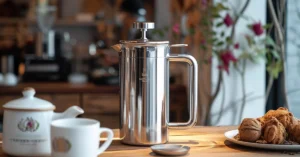Coffee naps combine a short nap with coffee to maximize alertness. You drink coffee then nap for 15-20 minutes, taking advantage of caffeine’s kick-in time. This can be especially helpful for afternoon slumps or long work shifts.
But wait, there’s more! This post will delve deeper into the world of coffee naps, exploring:
- The ideal amount of caffeine for your coffee nap
- How to time your nap perfectly to maximize the effects of caffeine
- Tips for creating the perfect napping environment
- Whether coffee naps are suitable for everyone
So, if you’re looking to banish afternoon slumps and elevate your focus, keep reading to learn how to harness the power of the coffee nap!
What You Need To Know About Coffee Naps
A coffee nap is a power-boosting strategy that combines the invigorating effects of caffeine with the restorative benefits of a short nap.
Science Behind Coffee Naps
When you feel sleepy, it’s often due to adenosine, a neurotransmitter that builds up in your brain and attaches to certain receptors causing sleepiness. While you nap, your body clears some of this adenosine from your brain.
Drinking coffee before a nap is strategic; caffeine takes about 20 minutes to take effect, coinciding with the suggested duration of a short nap. Essentially, as you wake up, caffeine competes with adenosine for the same receptors in the brain, often leading to heightened alertness and reduced sleepiness.
- Adenosine Clearance: Sleeping briefly reduces adenosine levels.
- Caffeine Advantage: Caffeine, which starts working after about 20 minutes, blocks adenosine from attaching to receptors.
Benefits and Drawbacks
Benefits:
- Energy Boost: You might feel more energetic as caffeine starts to work just as you wake up from a short nap.
- Reduced Sleep Inertia: This is the grogginess you sometimes feel after waking up. A coffee nap could mitigate these effects, making you feel more alert.
Drawbacks:
- Sleep Quality: Exceeding 20 minutes of napping can lead to deep sleep, making it harder to wake up and potentially resulting in sleep inertia.
- Health Considerations: Those sensitive to caffeine or with certain health conditions should use caution, as caffeine can affect sleep patterns and overall health.
Remember, for the best results, limit your nap to 15-20 minutes after consuming a cup of coffee to potentially counteract sleepiness and increase alertness without the grogginess often experienced with longer naps or the jitters that can come with too much caffeine.
How to Take a Coffee Nap
To effectively reap the benefits of a coffee nap, you need to time your nap correctly and create the right environment for a quick rest. Here’s how you can maximize alertness and prevent grogginess.
Ideal Timing
- When? You should aim to take your coffee nap early in the afternoon when you naturally start to feel a bit drowsy. The post-lunch slump is a perfect time.
- Duration? Set your alarm for 15-20 minutes. This duration is ideal because it prevents you from entering deep sleep, which can leave you feeling groggy instead of refreshed.
The science behind this is straightforward: caffeine takes about 20 minutes to kick in, so by the time you wake up, you’ll start feeling the caffeine’s effects.
The Right Setting
- Environment: Find a quiet, comfortable space where you won’t be disturbed. Lowering light levels can help signal to your body that it’s time to rest.
- Noise: Considering using a white noise app or machine to block out any distracting sounds that might prevent you from falling asleep quickly.
Remember, coffee naps are a band-aid, not a cure. Maintaining regular sleep hygiene is essential for continual alertness and health.
The Role of Caffeine
When you enjoy your cup of coffee, caffeine acts as a powerful stimulant that impacts your brain’s neurotransmitters and your overall energy levels.
Effects on the Brain
Caffeine functions by mimicking a natural brain chemical called adenosine. As you go about your day, adenosine builds up in the brain leading to feelings of tiredness. Once you consume caffeine, found in beverages like espresso, black coffee, or even iced coffee without added sugar or milk, it binds to the adenosine receptors. This action prevents adenosine from attaching to these receptors, which typically slows down nerve cell activity and makes you feel tired. Instead, with caffeine occupying these receptors, the opposite effect occurs – neuron activity speeds up, making you feel more energized and alert.
Caffeine also influences other neurotransmitters that affect your mood and mental health, like dopamine, that contributes to feeling happy and refreshed post-coffee.
Caffeine and Sleep Patterns
Although caffeine can disrupt your sleep pattern if consumed too close to bedtime, timing is everything. In the context of a coffee nap, caffeine’s role is strategic. The idea is to drink a cup of coffee quickly, and then take a 15-20 minute nap. This window allows caffeine to travel through your digestive system and reach your brain, where it begins to take effect just as you’re waking up.
This sequence leads to an increase in alertness when the nap concludes, as the caffeine starts its action in conjunction with the benefits of the short rest. By the time you wake up from the nap, you should feel more alert as the caffeine begins to vie for the adenosine receptors in your brain, thus giving you that refreshed feeling that can help combat drowsiness, particularly for those working night shifts or long drives.
Maximizing the Benefits of Coffee Naps
To ensure you’re getting the most out of your coffee naps, it’s essential to integrate them thoughtfully into your daily routine and be mindful of your overall health and wellness.
Incorporation into Daily Routine
Crafting a daily routine that includes a coffee nap can markedly boost energy levels and enhance mental acuity when faced with an afternoon slump. Here’s how to make it work:
- Timing: Aim to schedule your coffee nap early in the afternoon; this aligns with the natural dip in your circadian rhythm and avoids interference with your nightly sleep.
- Duration: Keep your naps between 15-20 minutes to prevent entering deep sleep cycles, which can lead to grogginess upon waking.
- Caffeine Dosage: Drink about two cups of coffee just before your nap. This amount of caffeine typically takes about 20 minutes to take effect, coinciding with your wake-up time.
Considerations for Health and Wellness
While coffee naps can be a beneficial addition to your routine, it’s important to consider their impact on your overall wellness:
- Sleep Hygiene: Ensure your regular nighttime sleep is undisturbed by maintaining good sleep hygiene. Avoid caffeine later in the day post-nap to prevent disrupted sleep.
- Individual Health: If you’re a young, healthy adult, coffee naps can enhance cognitive functions without significant risks. However, if you have health issues related to caffeine consumption or sleep disorders, consult a healthcare professional before incorporating coffee naps into your regimen.
- Physical Performance: Regular naps with caffeine might improve your physical performance, especially if you’re experiencing sleep deprivation.
By following these steps and considerations, you can tailor coffee naps to serve as a reliable productivity tool and a midday revitalizer for both your mind and body.
💡This might interest you as well
Ever felt tired when drinking coffee? Explore our blog post on why coffee can make you tired.
FAQ – Coffee Nap
What is a coffee nap?
A coffee nap is when you drink coffee just before taking a short nap, which is roughly 15-20 minutes long. The idea is to leverage the stimulant effects of caffeine upon waking.
Is coffee good for you before a nap?
Yes, having coffee before a nap can enhance alertness, especially if the nap is limited to 20 minutes. This timing allows you to wake up as the caffeine effect begins, maximizing the feeling of renewed energy.
How long is a coffee nap?
A coffee nap should last about 20 minutes. This length is short enough to prevent you from entering a deep sleep but sufficient for the caffeine to start taking effect upon waking.
Does coffee affect naps?
Coffee can affect naps by potentially disrupting your sleep if you consume it too close to bedtime. However, when timed correctly before a brief nap, it can complement the restorative power of a nap by aligning the onset of caffeine’s effect with the end of the nap.
If you liked our blog post on the topic “Coffee Nap”, don’t forget to leave us a comment down and share your thoughts on this topic.




